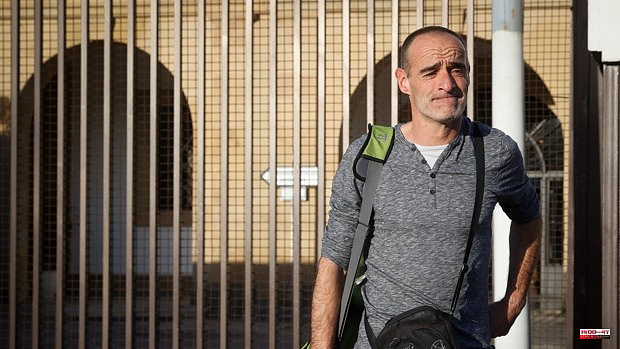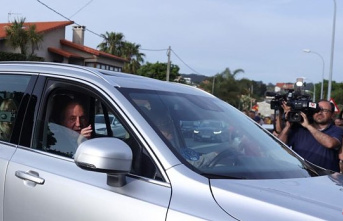Only the Government knows if the State Attorney's Office has used all the arguments at its disposal to prevent the ruling of the European Court of Human Rights (ECHR) in favor of ETA member Xabier Atristain, which forces Spain to annul the 17 years in prison that he was sentenced to. imposed in 2013 for being a member of ETA and to compensate him with 20,000 euros.
ABC has repeatedly requested the Ministry of Justice and the State Attorney's Office for their written opposition prior to that ruling on January 18 and the subsequent appeal, which was not even admitted at the beginning of this month. Or, at least, some data on the jurisprudence of the ECHR that Spain used to avoid that European ruling.
Neither the Government nor its legal services have provided this information not only to ABC, nor to the victims' associations.
The only clue is the ECHR ruling itself, which includes the allegations of the ETA member and the Government. The first argued that he was convicted for what he himself confessed after being arrested in 2010, thanks to which the Civil Guard seized numerous explosives and plans to attack him. Atristain turned to the ECHR in 2015 because, according to him, the agents threatened to arrest his girlfriend if she did not collaborate. He also denounced that he was interrogated without a lawyer he trusted, but rather with a court-appointed lawyer, as provided for by Spanish law for those detained for terrorism during the maximum five days they can be held incommunicado.
The judgment of the ECHR includes only two allegations of the State Lawyer based on the jurisprudence of the European court itself to refute the ETA version. The first, for a similar case in Switzerland in 1979 to argue that the European Convention on Human Rights (ECHR) "does not establish that a person must be represented by a lawyer while in police custody."
And the second, due to another precedent in Germany in 1992 according to which “the right to legal aid does not necessarily mean that the lawyer who assists the accused is of his own choosing”, but rather it can be ex officio. Only two examples and from 43 and 30 years ago, respectively. That is to say, little jurisprudence and in addition to the last century, when there is more recent and abundant.
For example, the resolution of the ECHR itself that in 2005 did not even admit the appeal of a person convicted of terrorism who alleged the same as Atristain. This is Neil Fraser Latimer, a member of a Northern Ireland unionist group convicted of the 1983 murder of the brother of a Sinn Fein councilor, the political arm of the IRA. He spent a week in a detention center, in which he also confessed and later retracted, assuring that he did so under police torture. Like Atristain.
The ECHR then ruled that access to a lawyer from police detention "is not explicitly established" in its Human Rights Convention and that it "may also be subject to restrictions for good cause." In addition, he recalled that the confessions of this terrorist before the British Police "were examined on several occasions" by different courts in the United Kingdom, in which he was represented by his lawyer and was allowed to testify. Identical to Atristain.
The ECHR also did not give credibility to the ill-treatment that Latimer used, even though the center in which he was detained was criticized by the Committee for the Prevention of Torture. Despite all this, the United Kingdom managed to prevent the Strasbourg court from even admitting the appeal. Unlike with Atristain.
More recent and forceful was another case in the same ECHR of which there is no evidence that the Government and the State Attorney have taken advantage of it. Strasbourg rejected in 2008 the appeal against Russia of a convicted person for raping and murdering a young woman, Aleksandr Ivakhenko. And he did it, among others, with a devastating argument.
"In the absence of a substantiated allegation that the confession was obtained as a result of ill-treatment, the mere fact that the applicant was initially questioned in the absence of his lawyer and that the court of first instance admitted his confession could not undermine the impartiality general of the trial”, then sentenced the ECHR. Just the opposite of what has just been ruled and ratified regarding Atristain, that he did have a court-appointed attorney and that he was examined daily by a doctor to certify that he was not mistreated.
The same European court then clarified that, although Ivakhenko's police interrogation was without a lawyer, that "did not deprive him of the opportunity to defend himself later" in the judicial investigation and in the trial. Again, like Atristain, that he had his own lawyer in both phases before the National High Court and in his subsequent appeals before the Supreme Court and the Constitutional Court, all of which endorsed his sentence to 17 years in prison.
Also in 2008, the ECHR knocked down more similar appeals at the first opportunity, such as one against Ukraine for a drug trafficking case. It was raised by a woman, Nina Sidorivna Tsyuz, questioned by the Police without being able to choose a lawyer. And, once again, the Strasbourg court recalled that its agreement "does not specify the conditions for the exercise of this right", but rather "depends on the specifics of the procedure and the circumstances of the case".
Although the details of these three examples were more restrictive than that of Atristain, the ECHR did agree with the United Kingdom, Russia and Ukraine in all those cases. Meanwhile, the Spanish government remains unclear if it used these or similar precedents against the European ruling that annuls the Spanish conviction of this ETA member. Or, if on the contrary, he used only a couple of examples and from the last century.
The Dignity and Justice victims' association has expressed its "great concern" fearing that the Government has dispatched this matter "without putting all the meat on the grill" to avoid that ECHR ruling against Spain. The same from which other ETA members have already benefited, such as Gorka Palacios and 'Gaddafi', whom the National High Court has acquitted of two attacks with sentences drafted by Judge José Ricardo de Prada applying the same 'Atristain doctrine'. Other countries, in very similar cases, had more luck or success against Strasbourg and the first.
2












